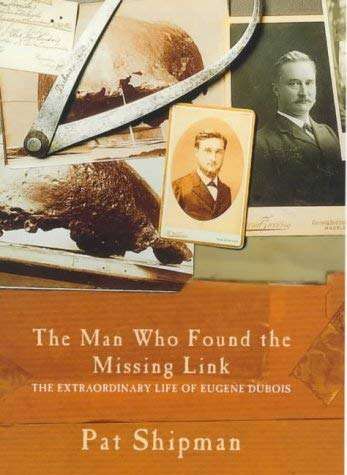
The Man Who Found The Missing Link: The Extraordinary Life of Eugene Dubois
Check my rate
| Main centres: | 1-3 business days |
| Regional areas: | 3-4 business days |
| Remote areas: | 3-5 business days |

| Main centres: | 1-3 business days |
| Regional areas: | 3-4 business days |
| Remote areas: | 3-5 business days |
Published by WEIDENFELD & nICOLSON, 2001, hardcover, illustrated, index, 580 pages, condition: as new.
Pat Shipman's book is a scientific biography, written like a novel. It tells the story of one of the greatest scientists at the turn of the century - a Dutchman called Eugene Dubois, now largely forgotten, but the man whose discovery of the 'missing link' altered our view of human origins. As a young man, he decided that the most important contribution a man could make to science would be to find the missing link. It would be the proof of Darwinian evolution, then still controversial. He deduced where the missing link should be and found the fossil, now known as homo erectus, in Java in 1891. Shipman uses a fascinating range of letters, diaries and photographs to tell the story of how Dubois' life and career exploded across the world in the 1890s.
This excellent biography by Pat Shipman delves deep into to life and career of Eugène Dubois. Using various source materials, including letters, diaries, and newspaper accounts, Shipman reconstructs key scenes from Dubois's life with the flare of a novelist. Dubois's primary claim to fame was the discovery of the first fossils of Homo erectus (called Pithecanthropus erectus by Dubois and also known as Java Man). This fragmentary specimen is also the result his greatest idea, as he was the first to suggest Indonesia as possible location to find Human ancestors. He would do other scientific work but he would spend much of his life promoting and defending his claim that he had found "the missing link".
Shipman clearly respects Dubois's scientific abilities but presents an honest, often unflattering portrait. Dubois was meticulous, brilliant, and determined but also thin-skinned, frequently petty-minded, egocentric, suspicious, and insensitive. Much of the book is framed by Dubois' friendship with Adam Prentice, a Scotsman who lived in the Dutch Indies. This strong friendship, which nonetheless was seriously strained by Dubois's behavior, was perhaps the closest emotional relationship Dubois ever had, even deeper than those with his wife or children.
The author,Pat Shipman is a professor of anthropology at Penn State University. Coauthor of the award-winning The Ape in the Tree, she writes for American Scientist and lives in Moncure, North Carolina.